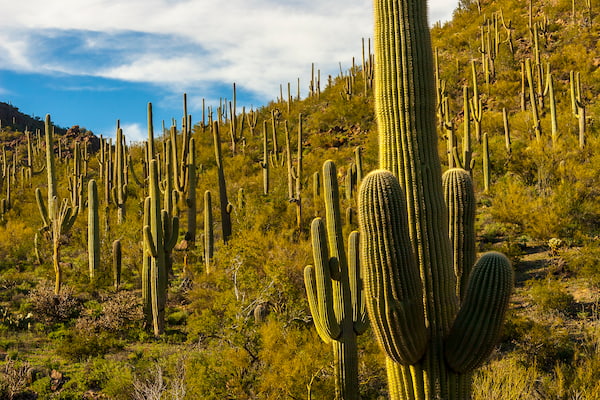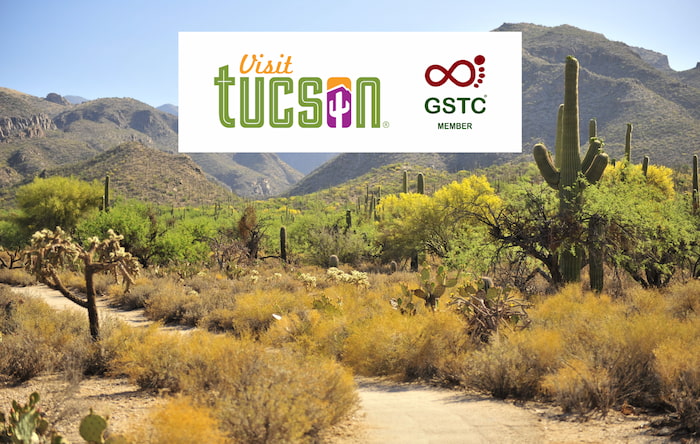Visit Tucson has joined as a member of the Global Sustainable Tourism Council (GSTC).
Located in southern Arizona, USA, Tucson is known for its distinctive desert landscapes and cultural diversity. Set within the Sonoran Desert, surrounded by five mountain ranges and bookended by Saguaro National Park, the city offers a combination of natural features and historical influences. Tucson reflects a blend of Native American, Mexican, and Western cultures, visible in its architecture, local traditions, and cuisine. This biodiverse region includes sites like Saguaro National Park, Coronado National Forest, and areas of ecological interest, along with a variety of cultural community events.
Sustainability Commitment
 Visit Tucson’s Tourism Master Plan provides a roadmap for growing the number of overnight visitors, length of stays, and tourism expenditures, while also emphasizing the need to develop more sustainable travel practices.
Visit Tucson’s Tourism Master Plan provides a roadmap for growing the number of overnight visitors, length of stays, and tourism expenditures, while also emphasizing the need to develop more sustainable travel practices.
“Visit Tucson is committed to promoting sustainable travel best practices that minimize negative impacts on the environment, conserve natural resources, and support the cultural traditions and well-being of our community,” says Visit Tucson’s Vice President of Destination Stewardship, Vanessa Bechtol. “We are excited to join as a member of the Global Sustainable Tourism Council, as we expand our work in destination stewardship to support a balance between quality of life for residents and quality of experience for visitors.”
Visit Tucson acknowledges and respects that Tucson resides on the land and territories of Indigenous peoples. Today, Tucson is home to the O’odham and the Yaqui tribes. Learn more about Native American Culture at VisitTucson.org/native-american-culture
 The City of Tucson has adopted several climate-related goals and policies. The “Tucson Resilient Together” climate action plan, approved in 2023, sets a target for carbon neutrality by 2030. Additionally, Pima County’s Priority Climate Action Plan identifies 25 projects intended to lower greenhouse gas emissions through 2030. Tucson has also held the designation of a Solar America City since 2007, with objectives that include achieving net-zero direct greenhouse gas emissions by 2050 and reducing carbon dioxide emissions by 80% by 2035. The Tucson Million Trees initiative has planted more than 120,000 trees to date.
The City of Tucson has adopted several climate-related goals and policies. The “Tucson Resilient Together” climate action plan, approved in 2023, sets a target for carbon neutrality by 2030. Additionally, Pima County’s Priority Climate Action Plan identifies 25 projects intended to lower greenhouse gas emissions through 2030. Tucson has also held the designation of a Solar America City since 2007, with objectives that include achieving net-zero direct greenhouse gas emissions by 2050 and reducing carbon dioxide emissions by 80% by 2035. The Tucson Million Trees initiative has planted more than 120,000 trees to date.
Tucson also addresses water conservation and waste reduction through several local programs. The city supports residential stormwater harvesting via the “Storm to Shade” initiative and is acknowledged for its water management practices in the arid Southwest. Waste reduction efforts are guided by the Zero Waste Roadmap, which promotes a circular economy. Programs such as Compost Cats and the Food Cycle Program have diverted over 20 million pounds of food waste from landfills. Tucson also participates in pilot programs designed to manage hard-to-recycle plastics and reduce landfill use.
GSTC Welcomes Visit Tucson
“We warmly welcome Visit Tucson as a member of the Global Sustainable Tourism Council. We look forward to working with Visit Tucson to advance sustainable tourism practices in Tucson, Arizona and beyond,” said Randy Durband, CEO of GSTC
About Visit Tucson
Visit Tucson is a 501(c)6 nonprofit organization that works to attract leisure visitors, group meetings, sports events, travel media, films, commercials, and photo shoots to the metro Tucson region. Visit Tucson is the official destination marketing organization for the City of Tucson and Pima County and partner with more than 500 business members throughout the community.
About the GSTC
The Global Sustainable Tourism Council® (GSTC®) establishes and manages global sustainable standards, the GSTC Standards, also known as the GSTC Criteria. The GSTC Destination Standard for public policy-makers and destination managers, GSTC Hotel Standard & GSTC Tour Operator Standard, GSTC MICE Standard for Venues, Event Organizers, and Events & Exhibitions, and the GSTC Attraction Standard for tourist attractions such as theme parks, museums, and national parks. These are the guiding principles and minimum requirements that any tourism business or destination should aspire to reach in order to protect and sustain the world’s natural and cultural resources while ensuring tourism meets its potential as a tool for conservation and poverty alleviation.
The GSTC Standards form the foundation for GSTC’s assurance role for Certification Bodies that certify hotels/accommodations, tour operators, and destinations as having sustainable policies and practices in place. GSTC does not directly certify any products or services but provides accreditation to those that do.
GSTC is an independent and neutral USA-registered 501(c)3 non-profit organization that represents a diverse and global membership, including national and provincial governments, leading travel companies, hotels, tour operators, NGOs, individuals and communities – all striving to achieve best practices in sustainable tourism. The GSTC is an ISEAL Community Member, a global membership organization for ambitious, collaborative, and transparent sustainability systems.
Information for media and the press: www.gstc.org/about/for-the-press/
Statements expressed in this announcement are presented for informational purposes only and should not be taken as an endorsement or recommendation by GSTC, unless clearly stated.
Photos © Visit Tucson




